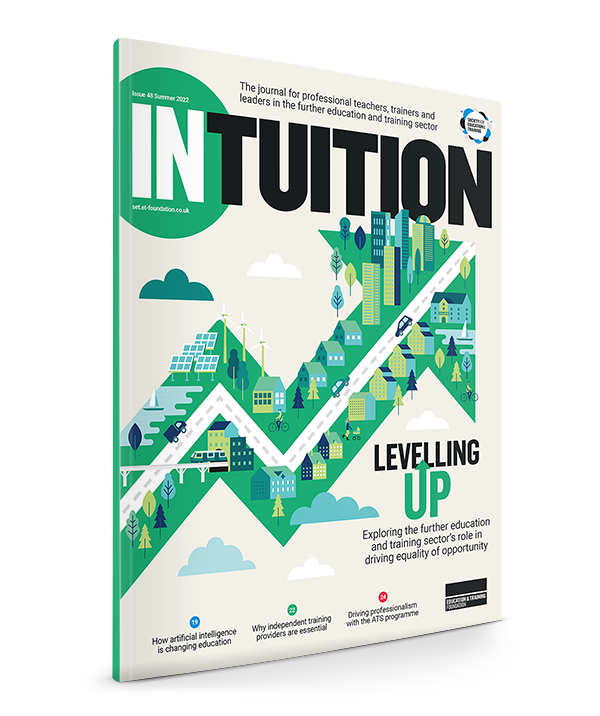inTuition taster: Time to reflect
Whatever your role in the Further Education and Skills sector, summer is the time when the days are longer, learner assessment lessens and many teachers and trainers manage to pause, review and then recharge their batteries.
As a team of advanced practitioners, we have reflected on activities or tools that have made an impact on us. We hope there is something for you to try or research for your own professional development.
Carlyn Peever MSET
Silent GROW
“I have found self-coaching a powerful tool to boost performance, unlock potential and set actionable goals. This empowers you by helping you to identify solutions within yourself. Using the GROW model helps you define your aspirations (Goal), assess current challenges (Reality), explore possibilities (Options) and set accountable actions (Way forward).
“Take time for yourself to reflect, and to engage in exploring ways to unlock potential solutions. Having the ‘way forward’ really helps to ensure I carry out the actions I set myself.”
Joanne Sutton MSET
The voice of AI
“I have been using Google NotebookLM as a reflection tool and to create a podcast from sources I have uploaded. Hearing the key points being discussed, I can decide whether my learning outcomes are met and whether the balance of messages is what I intended before using the resources with learners. I can also reflect on whether the examples are clear and whether my intention is coherent.
“Google NotebookLM will often suggest novel connections that I hadn’t considered, opening up a whole new area to explore. This can add a new dimension to the content that I can share with learners. I find this a useful tool and one I can also share with learners who might initially engage better with material in this format. I am now thinking about how learners could produce their own summaries in this way too.”
Charlotte Rowarth MSET
Leverage routine tasks into learning moments
“I like to make the best use of my routine tasks by incorporating learning moments, consciously including ‘bite-sized’ CPD activities in my daily routine and transforming everyday moments into valuable CPD opportunities. For example, I might read industry-related articles during my commute or listen to a relevant podcast or audio book while relaxing on the beach or walking the dog.
“Volunteering within your community can also contribute to your own professional growth and helps to expand networking opportunities. When I volunteered, I met people who later offered to do some guest speaking and mock interviews for my learners.”
Julia Musson FSET
Rolfe reflection
“I’ve always found there to be too many stages in Gibbs’ (1988) reflective cycle when trying to quickly think around a particular problem or issue in my delivery. Instead, I often default to the Rolfe et al (2001) model with its three easy-to-remember stages: What? So what? Now what?
“Jotting down thoughts as to what was going on with that last group or what responses I might have been getting to an activity (What?) and thinking through what the underlying causes or motivations might have been (So what?) can really short-circuit reflection and get to the core of an issue in a short amount of time.
“Using ‘Now what?’ really helps me to engage in practical and positive actions that can resolve an issue and to make constant improvements as I go along.”
Kathryn Langford FSET
Saying thank you
“In FE and Skills, we see thank yous to staff, awards to students to say thank you for their hard work and possibly a staff social gathering to acknowledge the success of the year. But as leaders in FE, could we show our appreciation more to the team around us? As teachers leading in the classroom, could we say more thank yous to the students who stay behind to clear up or give their time to help others?
“And can we say a thank you to ourselves for those times when we worked late to mark assignments or researched a different approach to tackle a problem to help one specific learner? Can we use reflection time to say thanks, affirm relationships, create belonging and look forward to future practice?”
Geoff Flower MSET
STARR searching
“If you have been interviewed recently, you may well have used the STAR(R) – Situation, Task, Action, Result, Reflection (what could you have done differently?) – response for structuring your answers, but this technique for reflection can also be used outside interview situations.
“I have often started line management meetings with this technique, asking the colleague to think about what they have done in the previous week. By giving them the opportunity to do this regularly, it embeds reflection into meetings. We could also do this with a team and involve everyone in the reflection, creating some collaborative points for learning.”
Views expressed are those of the authors and do not necessarily reflect those of SET.

Find out more about inTuition
inTuition is SET’s quarterly professional magazine supporting members' access to CPD resources and the latest sector and research news. It combines sector news with educational research and exciting practical developments and ideas in education and training.
Find out more
